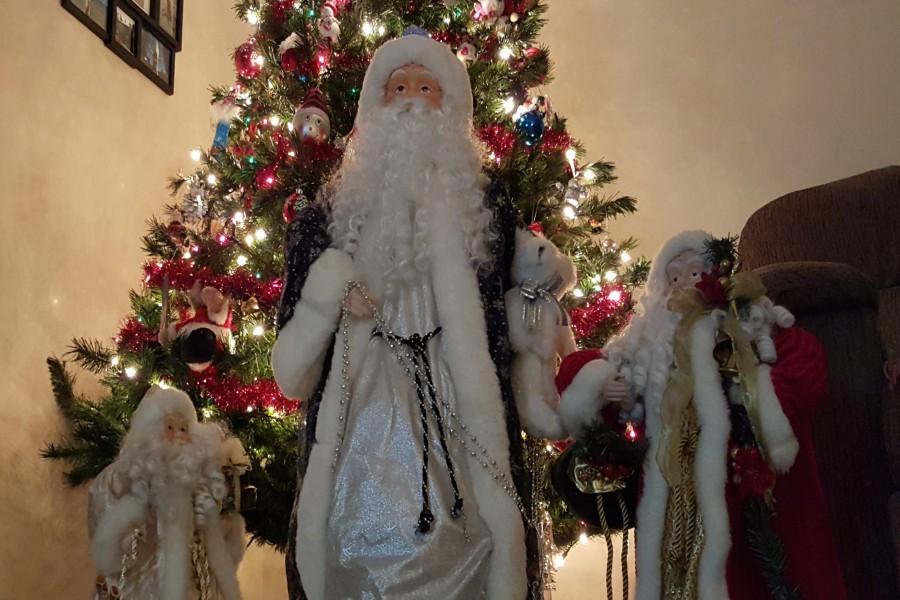Christmas traditions vary around the world
IMAGE / Kayla Smith
All around the world, people have different ideas of Santa and different Christmas traditions.
In four days people in the United States will be waking up bright and early and crowding around the Christmas tree. Children will be listening late at night for the sound of Santa Claus.
Senior Holly Kimmerling has two different traditions for Christmas. Kimmerling goes to both her dad’s house and visits her mom’s family at her aunt’s house.
“We always go to my dad’s house, and we do a white elephant Christmas,” Kimmerling said. “Then on the other side it is the only time of the year everybody comes together.”
A white elephant Christmas is where people buy generic gifts and then names are drawn to pick out gifts.
But how do people in other nations celebrate Christmas, if they do at all?
Let’s take a look at how the rest of the world celebrates this special holiday.
Argentina
In Argentina, most of their festivities take place on Christmas Eve. It is tradition for Argentinians to have a barbecue for dinner, to send “gloobs,” or paper decorations with lights inside floating in the sky (much like Chinese Lanterns) and to watch fireworks.
Also most people do not give or receive gifts and, if they do, they usually only exchange gifts with close family and friends.
Egypt
Although only about 15 percent of Egyptians are Christian, there are still some traditions that this small percentage of people carry on.
In Egypt they do not even celebrate Christmas on Dec. 25. They actually celebrate it on Jan. 7.
They also take on a vegan diet during the Advent, from Nov. 25 to Jan 6. Then, on Jan. 7, they indulge in a big feast. A popular meal to have is lamb soup.
Spain
Spaniards partake in many activities during Christmas.
They go to midnight mass, which they call La Misa del Gallo (The Mass of the Rooster) because it is said that a rooster crowed the night Jesus was born.
Spaniards usually eat their big Christmas meal, consisting of turkey and mushroom truffles (traditional), or seafood (popular), before they go to the service.
After mass ends, many people will walk the streets playing guitars and carrying torches.
Then, on Dec. 28, Spaniards like to play jokes on each other, much like April Fools Day in the United States.
Australia
In Australia, Christmas actually occurs during school’s summer break, so some families go camping on Christmas.
Australians like to decorate their houses with their native Christmas bush plant, lights, and wreaths. They also hold Carols by Candlelight services where famous Australian singers and fans gather to sing Christmas carols. These are often played on TV.
Children believe that Santa gives his reindeer a rest while in Australia and instead uses kangaroos.
For Christmas dinner, most families will enjoy a cold meal or a barbecue with prawns (shrimp) or lobster.
China
Although only one percent of the population is Christian in China, major cities will be decorated with lights and Christmas trees.
If families do have a Christmas tree, they are normally fake and are decorated with paper flowers and paper lanterns.
On Christmas Eve it is a popular tradition to give apples to people because the Chinese word for apple and Christmas Eve are similar.
Those who do celebrate Christmas also go to midnight mass.
Greece
In Greece, it is tradition for children to go caroling. If they sing well enough, they are given figs or nuts.
Christmas trees are not popular. Instead, most homes will have a shallow wood bowl with a cross wrapped in basil hanging from a suspended wire. This basil is dipped in holy water once a day to keep bad spirits away.
The Greeks have an Advent fast (like in Egypt) and will end this fast by going to midnight mass.
Unlike in the United States, children will receive presents on Jan. 1 and, like in Egypt, they celebrate Epiphany on Jan. 6.
Christmas traditions vary around the world, but in the end, the holiday is all about giving and being with family.

Class: Senior
Extracurricular Activities: National Honor Society, tutoring, cashier at Dairy Queen
Sports: Varsity tennis
Hobbies/Interests: Reading,...





